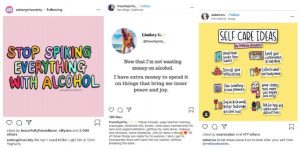
It’s not uncommon when you’re scrolling through social media to see pictures of wine, colorful cocktails, or even craft beer paired with the hashtag “#selfcare”. Breweries and wineries have even started hosting yoga classes and other fitness events.
It makes sense that, in a stressful world, a glass of wine or a cocktail at the end of a long day, or maybe even during a fitness class, can seem like a good idea, possibly a healthy one. Just one or two drinks can lead to feelings of relaxation and drowsiness.

Many people believe that an alcoholic beverage before bed helps them sleep better. And of course, every now and then an article will circulate, touting that drinking wine or beer daily improves your cardiovascular health, decreases diabetes, or even improves your memory.
But the data from the studies those articles stem from are not sufficient to recommend drinking as something that will actually benefit a person’s health. And when it comes to sleep, alcohol may help you fall asleep, but it actually disrupts sleep patterns and blocks REM sleep, causing anyone who drinks it before bed to have a less restful night’s sleep than if they hadn’t consumed alcohol.
When it comes to those feelings of relaxation, it’s true that alcohol can help quell feelings of stress and anxiety during the time of consumption due to its sedative effect. But using alcohol as a means to decrease anxiety usually backfires. Over the long-term, alcohol can actually increase anxiety symptoms. For people who already have an anxiety disorder, consuming alcohol can exacerbate their symptoms.
Some people’s lives depend on whether or not they stop or limit their drinking because they have an alcohol use disorder. But a person doesn’t necessarily have to have an alcohol use disorder for alcohol consumption to affect their health in milder ways. As previously discussed, just small amounts of alcohol can cause anxiety and sleep disturbances.
Obviously, drinking alcohol does have benefits, or people would not do it. The short term pleasant side effects described above, as well as the many social benefits of alcohol use are some of the reasons that people imbibe. Self-care is a complex and personal issue, but it’s quite possible to underestimate the risks of alcohol and overestimate its benefits. .
A large study published by The Lancet in 2018 that looked at several hundred data sources of individual and population-level alcohol consumption concluded that no amount of alcohol is good for your health. Other studies link alcohol consumption to 60 acute and chronic diseases, making it a leading risk factor for disease around the world.
In the United States, the number of people who have died from alcohol-related problems has more than doubled since 1999. The rate of people being admitted to emergency rooms for alcohol-related injuries has also increased.
Many people have decided to cut back on or give up drinking altogether, not as a means of recovery from a substance use disorder, but as an act of self-care and wellness. This is sometimes known as being “sober curious.” These are folks who may not have had the negative life consequences associated with alcohol use disorder, but feel that they would like to be more mindful about their relationship with alcohol and the ways in which it affects them.

Because of this, alcohol abstinence is finding its way into mainstream culture. Bars that only offer nonalcoholic beverages are popping up all across the country (Empath is Pittsburgh’s local “sober” bar). Spaces like this allow for the same social atmosphere that a bar provides, but without the alcohol and the hangover the next day.

There is a slew of non-alcoholic spirits, beers, and other beverages being marketed as an alcohol-free way to enjoy a delicious beverage. And people who may not be sold on the idea of abstaining from alcohol for an extended or unforeseeable amount of time are participating in month-long “sobriety challenges” like Dry January or Sober October.
Some will argue that the “sober curious” movement turns sobriety into something trendy and even could be seen as making a mockery of something that so many people’s lives depend upon. But when you’re dealing with a substance that experts are saying can be harmful in any amount, we shouldn’t question a person’s motivation for wanting to abstain or cut back.





